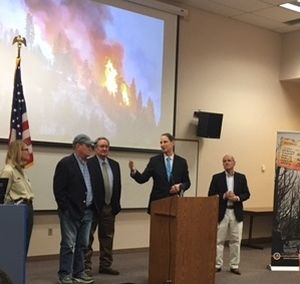Crapo, Risch, Simpson, Wyden join officials at NIFC to celebrate long-sought end to ‘fire borrowing’
After years of gathering annually at the National Interagency Fire Center in Boise to decry “fire borrowing” – the situation in which the Forest Service, each year, shifts millions from other programs when the costs to fight the West’s escalating wildfires balloons, thereby cutting prevention efforts meant to reduce that trend – a bipartisan group of congressmen and top agency officials had a different tone when they gathered at NIFC today: Celebration.
The fix for “fire borrowing” finally came in this year’s omnibus budget bill, which also allocated millions more for firefighting over the next two years before the new mechanism takes effect, allowing federal disaster funds, starting in 2020, to be tapped for catastrophic wildfires, just as they are for hurricanes or floods; you can read my full story here at spokesman.com. Sen. Ron Wyden, D-Oregon, called it “an uncommon triumph for common sense.” Idaho GOP Sen. Jim Risch said, “We’ve redone the way that firefighting is going to be funded, to free up the agency’s money to be used for what they should be used for.”
Idaho GOP Sen. Mike Crapo said, “This bill has been a bipartisan bill from the outset.” Plus, he said, it had near-unanimous support from hundreds of interest groups across the country, from timber interests to sportsmen to conservationists.
Risch said, “This was not a partisan deal – it was a bipartisan deal. If anything it was us in the West trying to convince our folks on the east coast.”
Idaho GOP Rep. Mike Simpson said many years of intense work went into the bill. “I believe this is the most important bill to affect the Forest Service probably in the last 50 years,” he said, “both the wildfire funding and how we do that, and the reforms that were made. It’s critically important.”
Wyden noted that the bill also funds the Secure Rural Schools program, on which rural Idaho counties rely to fund schools and roads; Wyden called that “a big, big boost for the West.”
The Wildfire Disaster Funding Act, which passed as part of the omnibus budget bill, also expands the Good Neighbor Authority program, under which state foresters partner with federal forest officials; Idaho already has been using the program to cooperatively conduct timber sales on federal forest lands.
Said Simpson, “As Jim said, it was tough getting some people from the east coast.” To laughter, he said, “I used to think I was going to have to go to the speaker’s district and start a wildfire.”
Acting U.S. Forest Service Chief Vicki Christiansen said she wanted to offer “just a heartfelt thank you.” She said, “You’ve given us resources in the omnibus to get the work going. … Thank you for your leadership, thank you for your commitment. … Fires don’t know any jurisdiction.”
The omnibus spending bill, H.R. 1625, passed the Senate on March 23, 65-32; both Crapo and Risch voted no on its final passage, after Risch held up the bill for hours in an attempt to remove language that Simpson had inserted to rename the White Clouds Wilderness after the late Idaho Gov. Cecil Andrus, Risch's longtime foe. It won final House passage on March 22 on a 256-167 vote, with Simpson voting yes but Idaho GOP Rep. Raul Labrador voting no.
Crapo’s spokesman, Lindsay Nothern, said today that Crapo’s “no” vote was because of “the overall spending levels. Obviously we supported the fire bill and always have. It was unfortunate it was included in the omnibus, because of the size of the omnibus. … Sen. Crapo has opposed a number of omnibus spending bills. He would prefer not to do omnibus spending, and instead to go through the normal budgeting process. So it was a very difficult vote.”
Asked if the Andrus wildnerness-naming issue played into Crapo’s “no” vote, Nothern said, “No, oh no. It was about the overall size of the bill.”
Labrador, in an April statement, said, “I opposed the ‘omnibus’ because I could not in good conscience vote for a bill that adds billions to the debt and puts our economy at risk.”

